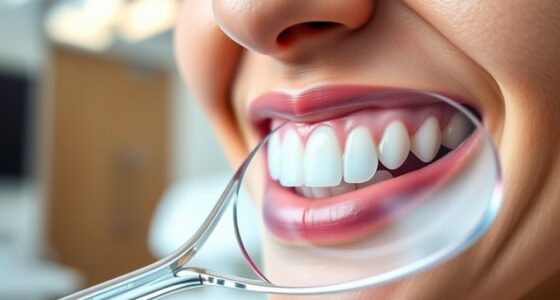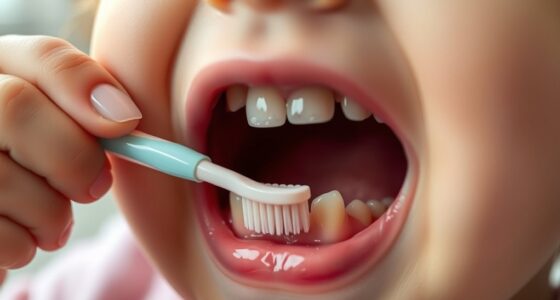If your child has asthma, their oral health needs extra care because medications and symptoms can increase the risk of cavities, gum disease, and oral infections like thrush. Inhalers can cause dry mouth, erosion, and boost bacteria, while asthma-related reflux may harm teeth. Good oral hygiene, rinsing after inhalers, and regular dentist visits help manage these risks. To learn more about protecting your child’s dental health, keep exploring effective strategies and products.
Key Takeaways
- Children with asthma are at increased risk of dental caries, dry mouth, and enamel erosion due to medication side effects.
- Asthma medications, especially inhalers with corticosteroids, can promote oral infections like candidiasis.
- Proper oral hygiene after inhaler use, including rinsing and brushing, helps reduce medication-related oral health issues.
- Regular dental visits and fluoride treatments are essential to manage decay, dry mouth, and gum problems in asthmatic children.
- Using spacer devices, sugar-free inhalers, and avoiding excess corticosteroids can minimize oral health complications.
Understanding Childhood Asthma and Its Symptoms
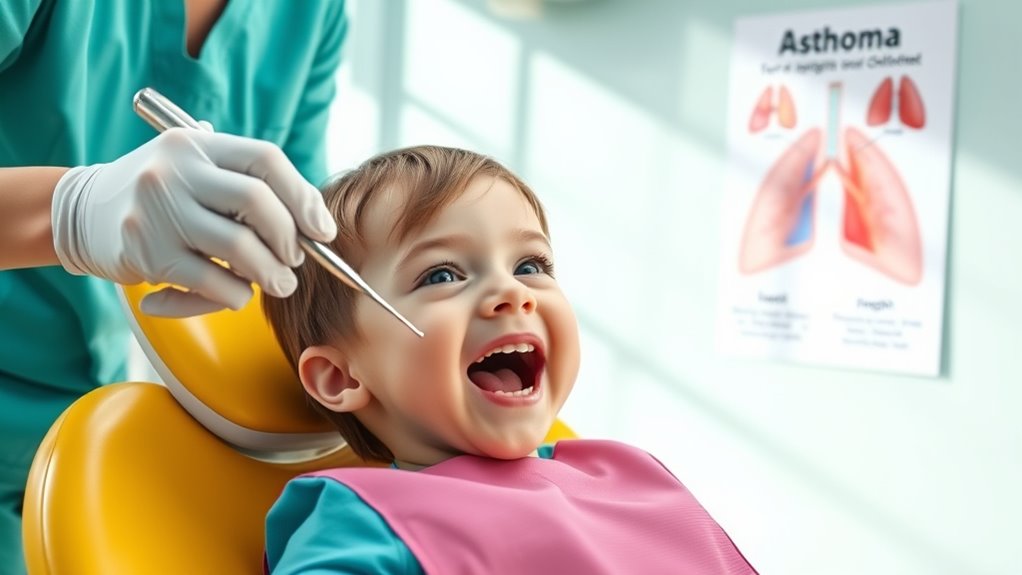
Understanding childhood asthma is essential because it’s a common condition that can substantially impact a child’s daily life. As you know, asthma affects about 8% of children in the US, with symptoms like wheezing, coughing, and difficulty breathing showing up early.
Kids with asthma often experience shortness of breath, chest tightness, and wheezing episodes, especially during physical activity or at night. These symptoms happen because of inflammation and narrowing of the airways, making breathing harder.
Flare-ups can be triggered by allergens, pollutants, or exertion, causing symptoms to come and go. Recognizing these signs early helps you manage the condition effectively, reducing the risk of severe attacks.
It’s also important to understand how asthma can influence your child’s dental health and mouth, highlighting the need for proper care.
How Asthma Medications Can Affect Oral Health

Many children with asthma rely on inhalers to control their symptoms, but these medications can have unintended effects on oral health. Inhalers, especially those containing corticosteroids, can increase the risk of oral infections like candidiasis and cause dry mouth, reducing saliva’s natural protection.
Some inhalers contain sugars or fermentable carbohydrates, which promote bacterial growth and dental caries if you don’t rinse your mouth afterward. Acidic ingredients in certain inhalers can also lead to dental erosion and enamel loss over time.
Proper rinsing with water after inhaler use helps clear residual medication, reducing harm to oral tissues and saliva. Long-term use of inhaled steroids may decrease salivary flow, making your teeth more vulnerable to cavities and infections.
Increased Risks of Dental Caries in Children With Asthma

Children with asthma face a markedly higher risk of developing dental caries than their non-asthmatic peers, primarily due to the effects of their medication and breathing difficulties. Inhaled corticosteroids and beta-2 agonists reduce saliva flow and pH, creating an environment where bacteria thrive. Frequent inhaler use causes oral dryness and acidity, impairing natural defenses and promoting bacterial growth. Studies show that asthmatic children have higher counts of *Streptococcus mutans* and more enamel defects, increasing their vulnerability to cavities. To minimize these risks, you should focus on maintaining good oral hygiene. Key factors include:
- Regular brushing and flossing
- Using fluoride toothpaste
- Rinsing after inhaler use
- Visiting the dentist routinely
- Monitoring for early signs of decay
Additionally, understanding the impact of automation in healthcare can lead to improved management of asthma and related conditions. Furthermore, research indicates that saliva composition plays a crucial role in protecting against dental decay, especially in children with compromised saliva flow. Recognizing the importance of dental health policies can also help implement preventive measures more effectively. Emerging saliva analysis techniques offer promising avenues for early detection and personalized treatment strategies in pediatric dental care. Incorporating oral health education into routine pediatric care can further enhance preventive efforts and reduce cavity incidence among children with asthma.
The Link Between Asthma and Dental Erosion
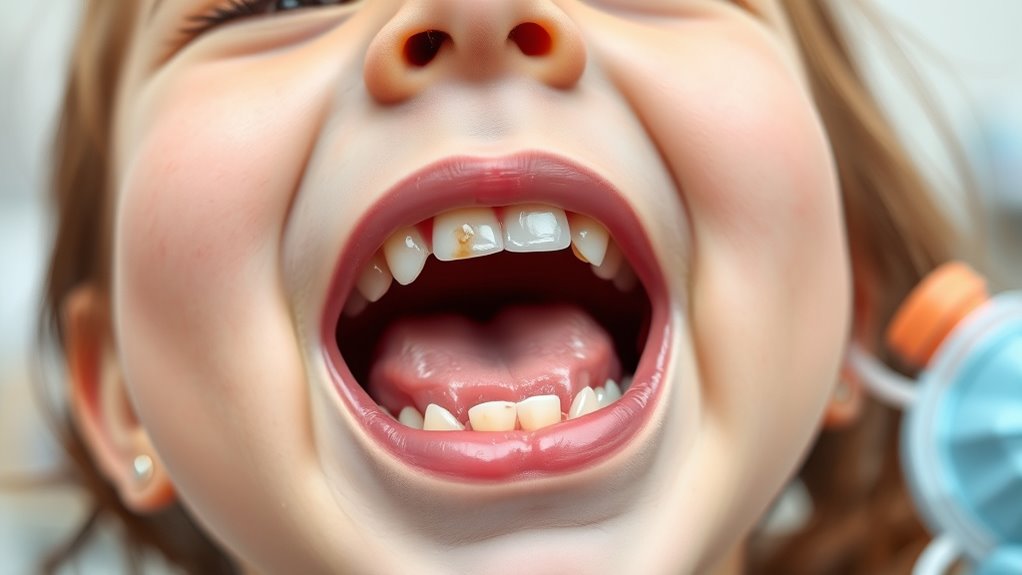
Asthma’s impact on oral health goes beyond caries, directly contributing to dental erosion in affected children. The medications used to manage asthma, especially inhalers, can reduce salivary flow, which normally helps protect teeth from acid attacks. Some inhalers contain high acidity or lactose, which can demineralize enamel over time, increasing the risk of erosion. Additionally, children with asthma often experience gastroesophageal reflux (GORD), exposing teeth to stomach acids that cause further erosion. The severity of dental erosion depends on factors like medication type, how often inhalers are used, and reflux symptoms. To reduce this risk, rinsing with water or fluoride after inhaler use and using spacers can help. Recognizing the role of AI integration in healthcare can also improve early diagnosis and management of dental issues related to asthma. Moreover, patient education about proper oral hygiene practices plays a crucial role in preventing erosion. Implementing preventive dental strategies, such as fluoride treatments, can further strengthen enamel and safeguard against erosion. Addressing these factors is vital for preserving your child’s dental health.
Periodontal Challenges Faced by Asthmatic Children

As an asthmatic child, your decreased saliva production and mouth breathing can weaken your mouth’s natural defenses, making it easier for plaque to build up. Long-term inhaler use can also increase inflammation in your gums, leading to periodontal issues. These factors, combined with immune response changes, heighten your risk of gum disease and inflammation. Additionally, Natural Language Processing (NLP) technologies are being utilized to analyze patient feedback and improve dental care strategies for children with asthma. The oral microbiome may also be affected by these conditions, further increasing susceptibility to periodontal problems. Recognizing the importance of fatherly guidance can also motivate children to adopt better oral hygiene habits, supporting overall health.
Salivary Flow Reduction
Reduced salivary flow is a common challenge faced by children with asthma, primarily due to the side effects of inhaled medications like corticosteroids and bronchodilators. This dry mouth impairs your mouth’s natural cleansing, making it harder to remove plaque and increasing your risk of periodontal problems.
When saliva production drops, the oral environment becomes more acidic, with pH levels falling below 5.5, encouraging harmful bacteria growth. The reduction in salivary flow also decreases protective factors like immunoglobulin A (IgA), weakening your mouth’s defenses.
This makes maintaining good oral hygiene more difficult, raising the chances of gingivitis and periodontal pocket formation.
To combat these issues, you should:
- Stay hydrated
- Practice thorough oral hygiene
- Use saliva substitutes if recommended
- Limit sugary snacks
- Regularly visit your dentist
Inflammatory Immune Response
Children with asthma often experience an altered immune response in their periodontal tissues, which can make maintaining oral health more challenging. Their inflammatory response tends to favor a Th2-dominant profile, impairing immune defenses against periodontal pathogens.
Elevated IgE levels in gingival tissues promote tissue destruction, while chronic inflammation hampers the body’s ability to fight bacterial colonization.
Long-term use of asthma medications, especially inhalers, can decrease salivary IgA secretion, reducing local immune protection and increasing susceptibility to periodontal infections.
Additionally, systemic inflammatory markers in asthmatic children are linked to deeper periodontal pockets and attachment loss.
These immune challenges highlight the importance of vigilant oral care to counteract the immune defenses compromised by asthma and its treatments. Understanding immune responses can help guide more effective oral health strategies for these children.
Managing Oral Infections and Candidiasis in Asthmatic Patients
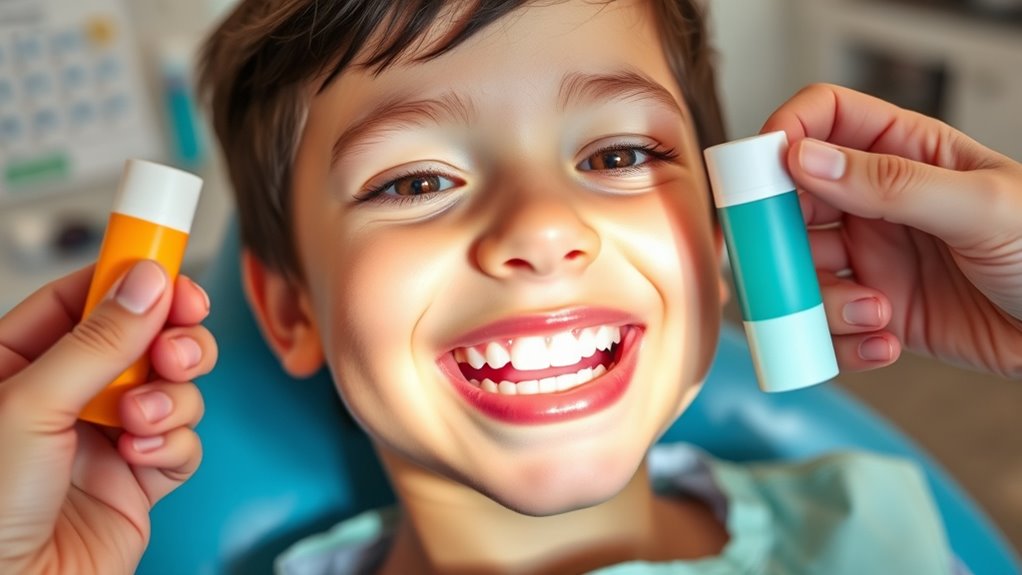
You should know how to spot oral candidiasis early, as white plaques that can be wiped away reveal red, inflamed tissue underneath. Since inhaler use increases risk, rinsing your child’s mouth thoroughly after each dose is vital for prevention. If infections persist, antifungal medications like Nystatin or fluconazole can effectively manage the condition. Additionally, being aware of oral health and AI detection advancements can help in early diagnosis and treatment planning. Incorporating advanced diagnostic tools can further improve detection accuracy, ensuring timely intervention.
Candidiasis Symptoms Identification
Recognizing candidiasis symptoms early is essential for managing oral infections in children with asthma, especially those using inhaled corticosteroids. Oral candidiasis often appears as white, pseudomembranous plaques that can be wiped away, revealing red, inflamed mucosa underneath.
These lesions frequently develop on the soft palate, buccal mucosa, and oropharynx, sometimes causing discomfort or a burning sensation. Proper symptoms identification helps prevent secondary infections and ensures prompt treatment.
Be alert for:
- White patches that wipe off easily
- Red, sore areas in the mouth
- Burning or discomfort while eating or drinking
- Cracked corners of the mouth
- Increased sensitivity or pain in the oral cavity
Early detection enables timely use of antifungal treatments like Nystatin or fluconazole, safeguarding children’s oral and overall health.
Impact of Inhaler Use
Inhaler use, especially with corticosteroids, can markedly increase the risk of oral infections like candidiasis in children with asthma. When you use your inhaler without rinsing your mouth afterward, medication deposits in the oropharynx, creating an environment that promotes fungal overgrowth. This can lead to oral candidiasis, which appears as white plaques that may be wiped off. AI technology can assist in developing better treatment protocols for managing and preventing these infections. Inhaler use also causes dry mouth and reduces saliva flow, further encouraging Candida colonization on your oral mucosa. Maintaining good oral hygiene is essential; rinsing your mouth with water or fluoride mouthwash after each inhalation can significantly lower infection risk. Additionally, proper inhaler technique can help minimize medication deposition in the mouth and reduce side effects. Using antifungal mouth rinses as recommended by healthcare providers can further help prevent fungal overgrowth. Incorporating mindfulness practices such as gentle breathing exercises can also promote oral health and reduce stress-related symptoms that may exacerbate oral infections.
Addressing dry mouth through proper care helps prevent oral candidiasis and supports overall oral health in children with asthma.
Prevention and Treatment Strategies
Effective prevention and treatment of oral infections like candidiasis in children with asthma hinge on proper oral health practices and timely intervention. After using inhalers, rinse your child’s mouth thoroughly with water or fluoride mouthwash, then brush teeth to reduce fungal buildup. Regular dental check-ups ensure early detection and management. To minimize risk factors, use spacers with inhalers and avoid sugar-laden medications. If candidiasis develops, topical antifungals like Nystatin or systemic agents such as fluconazole can effectively treat the infection. Educating caregivers about proper oral hygiene and avoiding overuse of asthma medication that irritates oral tissues further supports prevention. Relationships can influence health behaviors and adherence to treatment routines, highlighting the importance of communication between caregivers and healthcare providers. Maintaining consistent oral hygiene routines is crucial for overall health. Rinse mouth after inhaler use, use spacers to reduce residue, limit sugar in medications, and seek prompt dental care when needed. Additionally, understanding how dream symbols relate to subconscious feelings can improve awareness of emotional well-being, which may impact health behaviors and stress management. Incorporating proper oral hygiene practices, such as regular brushing and rinsing, can significantly decrease the risk of oral infections. Incorporating essential oils for oral health, such as clove or tea tree oil, may offer additional support in maintaining a healthy oral environment. Moreover, proper nutrition plays a vital role in strengthening immune defenses and preventing infections in children.
Best Practices for Dental Care in Children With Asthma
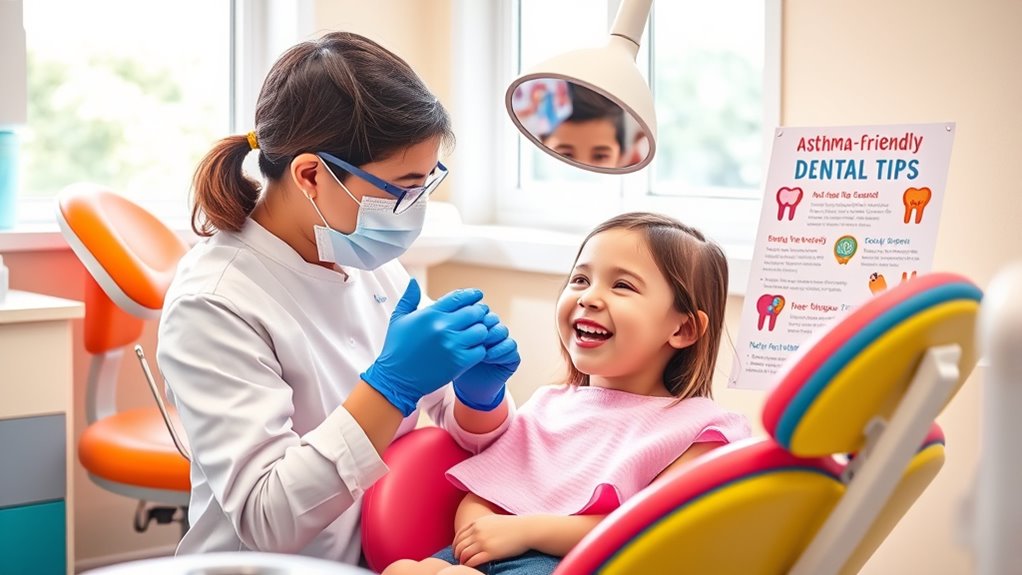
Children with asthma require tailored dental care practices to prevent tooth decay and oral health issues related to their condition and medication use. After inhaler use, rinse your child’s mouth with water or fluoride mouthwash to reduce residual medication and neutralize acids that can damage the enamel. Proper appliance maintenance and regular dental visits are essential parts of managing oral health in these children. Regular dental check-ups every six months help detect early signs of cavities, gum disease, and infections common in asthmatic children. Use fluoride toothpaste and varnishes to strengthen the enamel, especially since asthma medications can cause dry mouth. Educate your child and caregivers to avoid sugary foods and drinks, which worsen the risk of cavities in dry mouths. Monitoring for symptoms of oral health issues can help address problems early and prevent complications. Staying aware of oral health risks associated with asthma medications can further help in preventing dental problems. Understanding the impact of medication side effects and maintaining good oral hygiene routines can significantly improve your child’s dental health. Collaborate with healthcare providers to adapt strategies, including proper inhaler technique and medication adjustments, to support your child’s oral health effectively. Additionally, being aware of dental health laws and guidelines can help ensure your child’s care adheres to best practices and legal standards.
Strategies to Protect and Improve Oral Health in Asthmatic Kids

Implementing specific strategies can markedly enhance oral health for kids with asthma.
To reduce the caries risk and protect dental health, encourage children with asthma to rinse their mouth with water or fluoride mouthwash after inhaler use.
Applying fluoride varnish during dental visits strengthens enamel and prevents decay, especially in corticosteroid users.
Using sugar-free inhalers and spacers minimizes acid and sugar exposure, lowering decay chances.
Educate kids and caregivers on proper oral hygiene, such as brushing twice daily with fluoride toothpaste, to combat medication-related issues. Regular dental check-ups help detect and manage dry mouth, mucosal lesions, and early caries.
Maintaining proper oral hygiene is essential for preventing oral health complications in asthmatic children, and being aware of dental product selection can further support their oral care routine. Additionally, understanding antioxidant properties of certain honey varieties may be beneficial if used as part of a natural oral health routine.
Frequently Asked Questions
Can Dental Problems Cause Asthma?
You might wonder if dental problems can cause asthma. While they don’t directly cause asthma, poor oral health can worsen it.
Infections like gum disease allow bacteria and inflammation to enter your bloodstream, potentially triggering respiratory issues. Bacterial toxins and irritants from dental infections can also provoke asthma attacks.
To help manage your symptoms, maintain good oral hygiene, visit your dentist regularly, and address dental problems promptly.
What Triggers Asthma in Children?
You’re wondering what triggers asthma in children. Common triggers include viral infections, airborne allergens like pollen, dust mites, mold, and pet dander.
Environmental irritants such as cigarette smoke, pollution, and strong odors can worsen symptoms. Physical activity may cause exercise-induced bronchoconstriction, and exposure to chemicals or fumes can provoke attacks.
Changes in weather or humidity also play a role. Being aware of these triggers helps you manage and reduce asthma episodes effectively.
How Poor Dental Health Affects a Child’s Body?
Poor dental health affects your child’s body by allowing bacteria to enter the bloodstream, risking infections like endocarditis. It causes inflammation, which can worsen other health issues like heart disease.
Dental problems also lead to pain and discomfort, making it hard for your child to eat well, impacting growth. Additionally, infections and inflammation can irritate the respiratory system, potentially increasing asthma symptoms and affecting overall immune function.
Do Kids With Asthma Get Sick Easier?
You might think kids with asthma are just more prone to specific asthma attacks, but they actually get sick easier overall. Their compromised immune response and airway inflammation make them more vulnerable to respiratory infections like colds and bronchitis.
It’s like fighting an uphill battle, as their bodies take longer to recover from illnesses. So, yes, kids with asthma are more susceptible to getting sick and may face more challenges when they do.
Conclusion
Think of your child’s mouth as a delicate garden, vulnerable to storms like asthma. With proper care and attention, you can shield this garden from weeds and pests, ensuring it blossoms healthily. Regular dental visits, good hygiene, and managing asthma control are your tools to nurture this vibrant, thriving space. By tending to both, you create a resilient landscape where smiles flourish, proving that even amidst challenges, growth and beauty can thrive with dedicated care.


